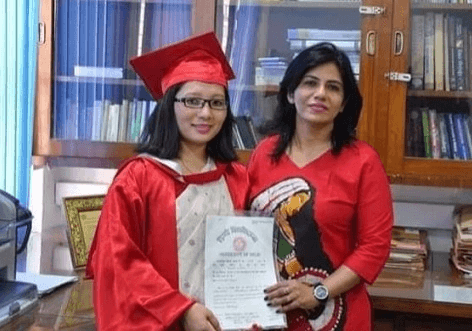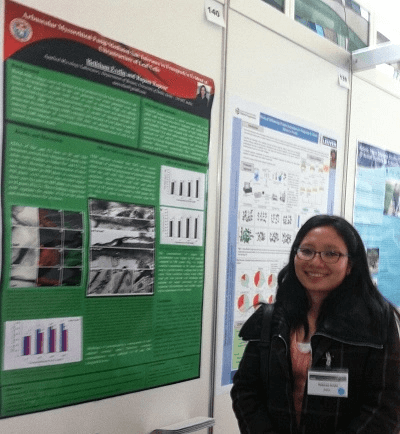
Manasasri Muralidharan
As she juggles teaching, research, and two kids, Evelin (she/her) opens a vista into her journey in academia for us.
“One of my dreams is to have a plant named after me”, exclaims Dr Evelin Heikham, a botanist with a passion for unearthing the rich floral biodiversity in North-East India. Named so because she was born in the evening, Evelin Heikham (pronounced E-ve-lin High-kham) grew up in a small Manipuri village about 17 km away from the capital city of Imphal.
Academically inclined since childhood, Evelin initially wanted to become a lawyer! Her love for science slowly shifted her interest to chemistry and subsequently settled on life sciences. “It was a nice time when we were very young,” she reminisces. But this quickly changed. As Evelin grew up, the insurgency problem in Manipur exacerbated. She had to contend with the blanket presence of the Armed Forces Special Powers Act (AFSPA) and the simmering tensions stemming from the Nagaland-Manipur integrity issue regularly. “Strangers would enter your house at will and demand money and transportation.” Boycotts and class disruptions were routine. It was normal to be hauled out of classes to form human chains on the roads, sit-in protests, and rallies.
Evelin’s final school years in Imphal’s reputed Tamphasana Girls’ (TG) Higher Secondary School were dotted with protests against overarching government interventions, restrictive school dress codes, and exam delays. Despite these obstacles, she continued with her education and excelled at her studies. Evelin’s parents advised her to leave Manipur for her higher studies to avoid further interruptions in their daughter’s education.
To pursue her education in life sciences without interruptions, Evelin moved to Delhi. Here, she was met with disappointment when she couldn’t get the course of her choice. “I wanted to study Zoology!” says the woman with a PhD in Botany. She began her undergraduate journey in Botany within the spacious halls of Khalsa College, University of Delhi (DU). Being thrust into a new environment and unfamiliarity with Hindi and Punjabi caused some issues initially. She credits her batchmates for extending a warm hand of friendship that helped her overcome the language barrier and adjust to life in Delhi. Evelin also mentions her professor, Dr Inderdeep Kaur, as her “main guiding force” during her time at Khalsa college.
As she continued with her education, Evelin was steadily attracted to a life in academia. She completed her Master’s in Botany from DU, cleared the CSIR-NET exam, and went on to do her PhD in Prof. Rupam Kapoor’s lab at the Department of Botany, DU. She jokes that the driving force behind her intention to pursue PhD was the addition of the prefix “Dr.” to her name!

Mentor and mentee: Dr. Roopam Kapoor (Right) and Dr. Evelin Heikham on graduation day (15th March, 2013)
Evelin believes that she found a goldmine after joining Prof. Kapoor’s laboratory. She was encouraged and supported by Prof. Kapoor throughout her PhD tenure. Evelin studied the beneficial effects imparted by mycorrhizal fungi to plants that grow in extremely saline regions for her thesis. She explains that the increasing agricultural demands are causing cultivable lands to turn inhospitable and saline at alarming rates. Evelin investigated how mycorrhizal fungi could be used as bio-fertilizers to help plants thrive in such stressful soil conditions.
She mentions that her PhD work was just the tip of the mycorrhizal iceberg. She hopes to explore this avenue further in her current position as a PhD supervisor and assistant professor in the Department of Botany, Rajiv Gandhi University (RGU), Arunachal Pradesh. Before joining RGU, Evelin worked as an ad-hoc professor at Sri Venkateswara College, DU. She finds teaching extremely rewarding and states that the best part of her job is the interaction with students.
Evelin’s academic journey is currently in a new and interesting phase. She is a young Principal Investigator establishing her lab in a reputed institution in Arunachal Pradesh. Her enthusiasm to make a mark in her field of work is palpable. As a botanist, Evelin is aware of the hidden plant biodiversity of NE India. She has decided to focus her efforts on categorising the diversity of bryophytes in the region. Bryophytes are tiny, non-flowering plants that grow unobtrusively in small cracks and crevices. She stresses that there is no database categorising these plants in Arunachal Pradesh and hopes to be the first to create one!
Unwilling to give up on the unexplored potential of mycorrhizal fungi, Evelin is also investigating how mycorrhizae affect the build-up of bioactive molecules in plants. These molecules are by-products of plant metabolism and are known to show antioxidant, antimicrobial, anticancer properties. Evelin mentions the discovery of Artemisinin, a bioactive molecule with antimalarial properties, derived from the plant Artimisia annua (Sweet-wormwood). Bioactive molecules are known to impart medicinal properties to plants. Evelin wishes to study how mycorrhizal fungi influence the growth of such plants, increasing their medicinal value and commercial potential. She is currently working with two known plant species that have immense medical importance, Panax pseudoginseng, also known as Pseudoginseng or Himalayan Pseudoginseng, and Solanum khasianum, commonly called European black nightshade. It is to be noted that Panax is endemic to NE India and is creeping towards extinction. Evelin believes that using mycorrhizal fungi as biofertilizers might help the plant flourish.
A by-product of researching medicinal plants was the creation of a database detailing plants with fibre-yielding potential. The project was spearheaded by her Master’s student, Junmoni Das, who lived in Assam. They created a new database categorising regional plants from which fibre can be extracted. This knowledge may be used to make products such as ropes, mats, thatches, and more, from the plants.
Evelin notes that increased government investments and education initiatives in NE India have promoted positive changes in the region’s STEM sector. She cites the doubling of departments at RGU since her joining in 2014 as an example. Her university also offers a Masters by research degree, preparing students for research careers. Evelin states that the internet is a good place for students who are seeking better opportunities for themselves. She mentions the merits of the well-advertised Massive Open Online Courses (MOOC) and Study Webs of Active-Learning for Young Aspiring Minds (SWAYAM) courses. These courses help both students and teachers to build their knowledge base. She believes that academicians such as herself have a sworn duty to render aid to students and inform the government about how best to direct their resources to better the education sector.

Evelin presenting her work to an international audience at a conference in Vienna, Austria (2012)
One of the governmental outreach ventures that she is part of is the Social Media Champions initiative begun by the Ministry of Education in universities across the nation. As the elected champion of her department, she uses social media to publicise the Botany department’s happenings, achievements, and research initiatives. She hopes that her efforts will give prospective students more clarity about the opportunities in the NE-STEM sector.
An added nuance to Evelin’s career is her work-life balance. With her husband working in another state, Evelin has been managing her job and two kids single-handedly. Her career has experienced some pauses due to her pregnancies and maternity leaves. She emphasises that without the support of her husband, department colleagues, and the university, life would have been far more difficult. She hopes that the government will take steps to make life easier for working mothers in academia.
According to Evelin, there is immense potential in North-East India, but there are logistics problems. “If we need chemicals, you need to wait for multiple months,” she states. Whilst structuring her research proposals, she avoids delicate experiments that need extensive chemical usage. “Why should I bring such roadblocks in my life?” she rightfully questions.
Evelin hopes that the influx of government and private sector investments in the region will lead to the establishment of small and large-scale industries catering to STEM research shortly. She states these measures, along with provisions of specialised research facilities, will encourage PhD supervisors to write more ambitious research proposals. In her case, her current bryophyte diversity study is simple and elegant. It involves plant collection and dissection and their subsequent study under the microscope. “And, if I am lucky, I can name one!” she quips.
This article is a part of the series People of North-East India.
Acknowledgements: SciRio thanks Dr Evelin Heikham for allowing us to use the images in the piece.
Edited by: Hansika Chhabra





